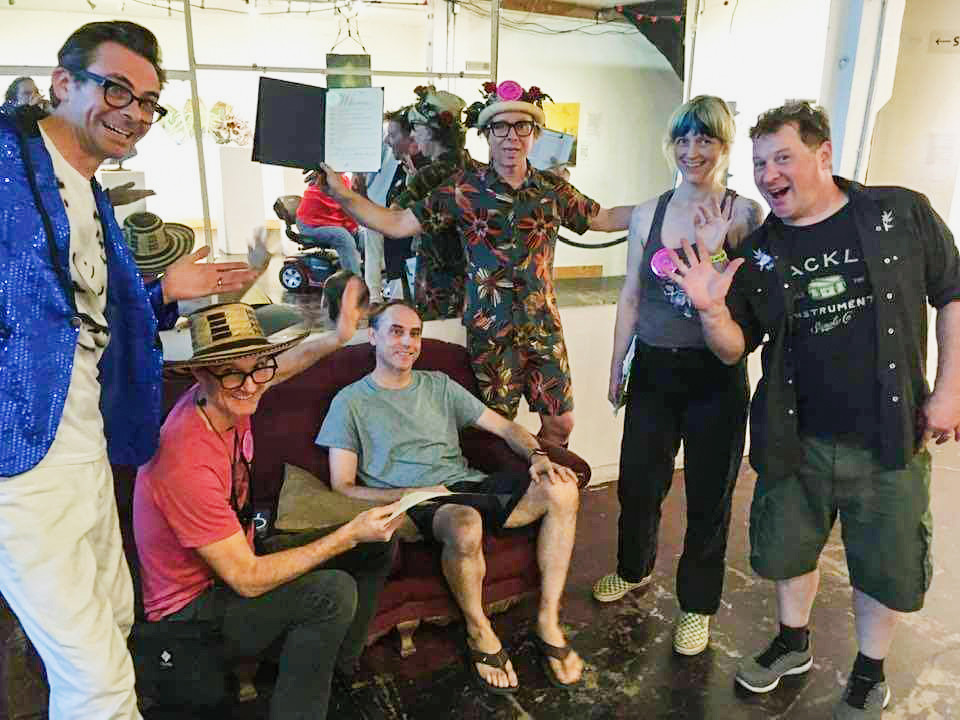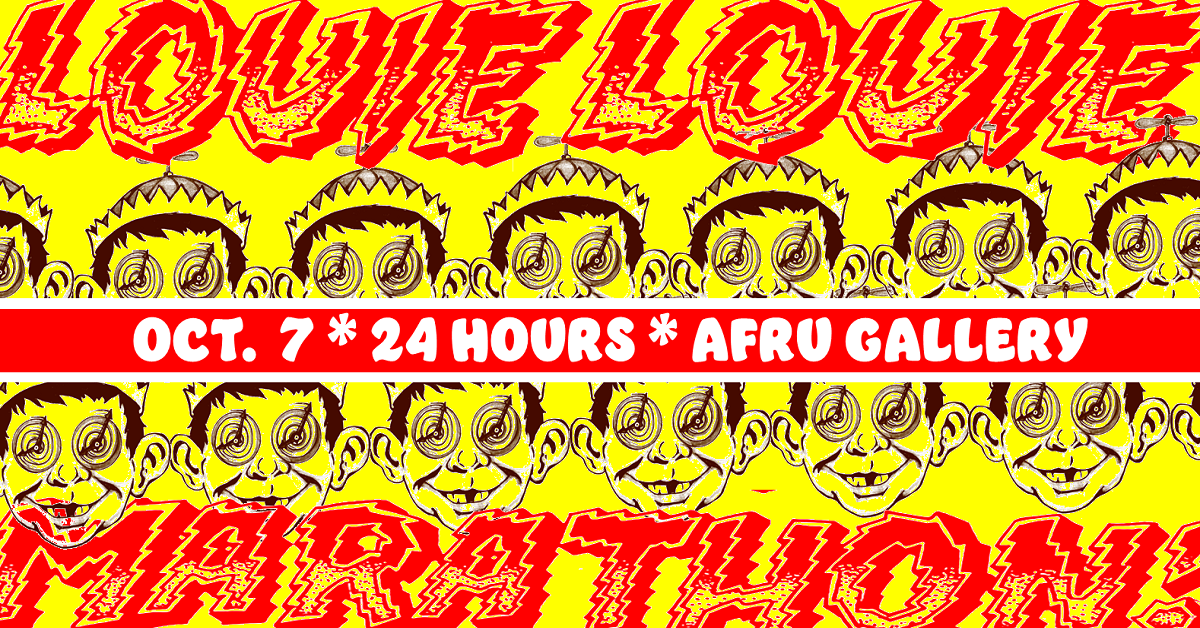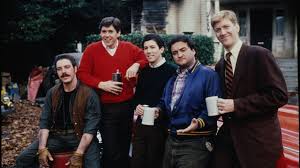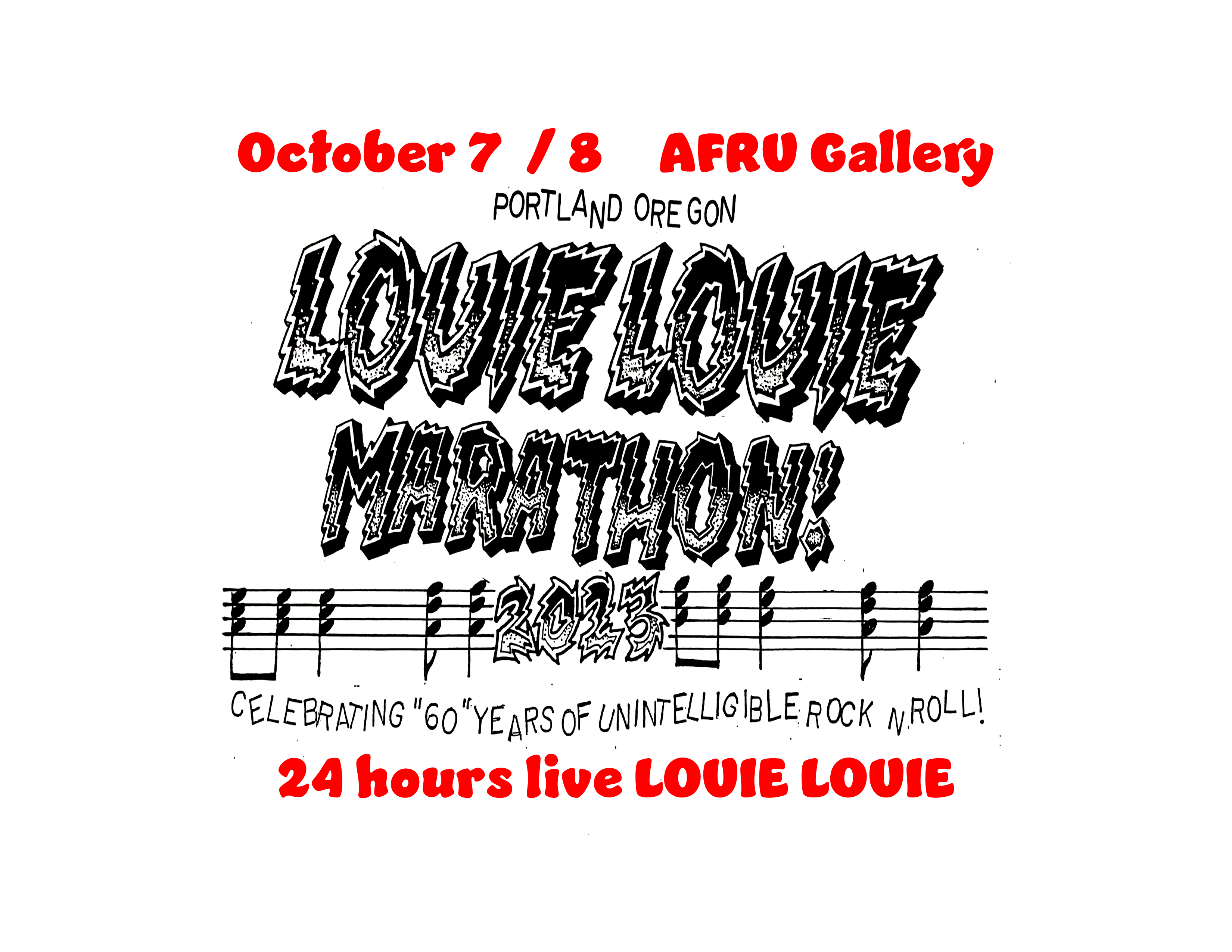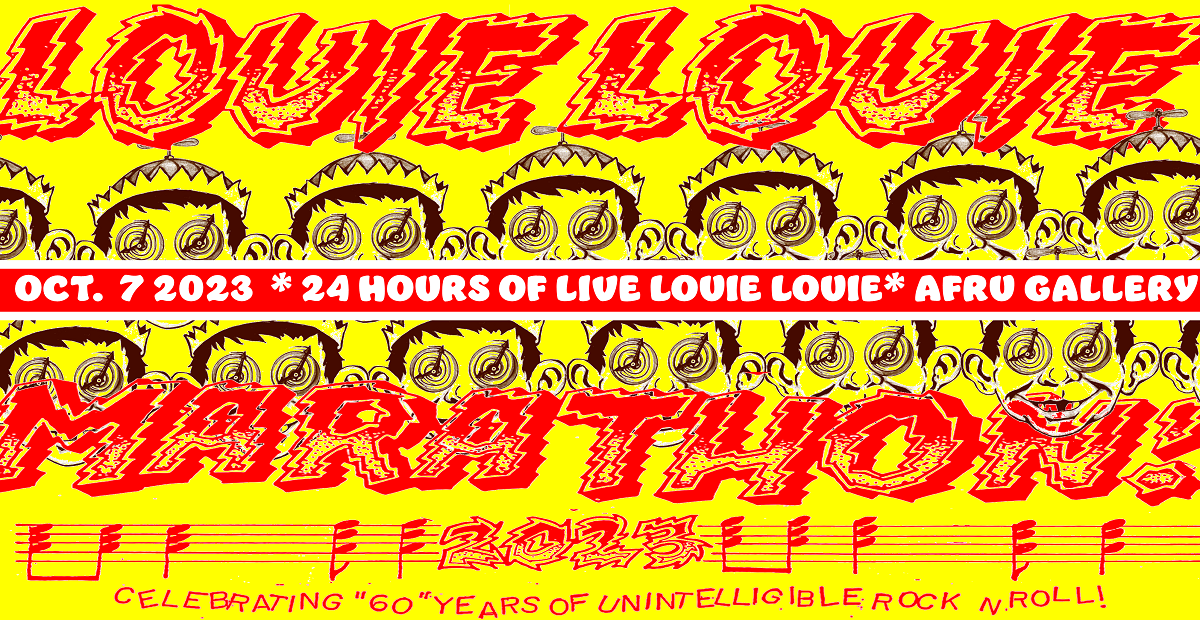Louie Louie History History – as compiled by Julie, a member of the Louie Louie Committee Committee
ABOUT THE LLCC
Many, many years ago, in a humble abode in North Portland, a then-young man named Luke Strahota had the crazy idea that just might be crazy enough to work: a 24 Hour Louie Louie Marathon. In his mind, he saw a telethon event akin to the Jerry Lewis telethon. Luke wanted a bank of phone operators, a wacky non-stop talking presenter, and bands…a non-stop line up of bands playing the hit song Louie Louie created by Richard Berry and made infamous by The Kingsmen.
This vision resonated in Luke’s head. He told his spouse, who said something like “it’s so crazy it just might work” but the idea was like many of the best and was set to one side while Luke tackled music fest projects like Nuggets Night & Rave Up.
Then one day, Luke was visiting with Matt Stanger. He mentioned the 24 Hour Louie Louie Marathon and Matt’s mind began racing. As a person who also put together music fests like Gotham A Go-Go & wrote stage plays (Bikini Creature Beach Feature & The Groovy Vernacular Hippy Spectacular) as well as other wild collective fun, Matt immediately saw another version – one with a toga party, with a “keep your hand on the car” contest and a “dance alike” contest and so much more.
Years passed. But the dream was not forgotten. In early 2023, at a Greg Bigoni gallery showing, the idea was brought up and this time at a table including Jen Lane of Barfly, Julie Madsen of First Wednesday Readings & Work Literary Magazine, Taylor Valdes of The Venderia, & Megan Stanger. The synergy was strong. The group decided to meet again. And the Louie Louie Committee Committee was born.
Adding a few additional power-house talents to the crew, such as Michael Joyce who helped establish The Portland Winter Light Festival, Eric Kilkenny [dj on many platforms including WFMU, designer, and musician], Craig Giffen [recorder of many pdx events, as well as inventor of the human clock, & collector of the tee shirts of heavy metal parking lot], Justin Thorpe [musician about-town & one of Portland’s finest audio engineers], & Chris Pickolick of Don & The Quixotes, the LLCC began contacting people they knew HAD to be involved in … [dramatic pause] … this epic event of preposterous proportions.
While we do not have the telephone operators waiting to answer your calls and collect your donations, we do have bands…a non-stop line up of performers playing the hit song Louie Louie. The song will be going a full 24 hours at Portland’s #1 all-night-long party-til-you-drop Art & Performance Gallery AFRU.
And in 2023, October 7th & 8th, the event occurred with approximately 400 people participating to make it happen. The event attracted an unknown number of in-person audience members, and nearly 4000 live stream viewers.
ENOUGH ABOUT THE COMMITTEE, Let’s learn about THE SONG
…yeah … Here’s the history of the song!
ABOUT THE SONG
Richard Berry wrote and originally performed the song. He copyrighted the song March 1957
His version was released on 7” vinyl in September 1956
The Wailers released a version in 1961. Their version was VERY popular. So popular that the FBI files include details regarding how one record station couldn’t get the rights to spin The Wailer’s release, so they asked The Kingsmen to cover the song. That radio station was KISN FM (now streaming at https://goodguyradio.com/)
The Kingsmen’s version is where history becomes debated. It’s also The Kingsmen’s version that is notorious for being investigated by the FBI, US Attorney General’s office, Justice Department, US Post Office, and the FCC. Their version was flagged by concerned citizens for obscenity multiple times and the details are laid out below. Scroll down for a day-by-day recounting, plus PDF of the entire FBI file.
We have reporting discrepancies on The Kingsmen’s recording versus release date. Many sources state April 6 as the release date, however we have more convincing reports of recording date in April with release in May. Many sources say April 6 was recording day, but we also have April 13 as a possible recording day. According to one source Paul Revere & the Raiders and The Kingsmen had shared members at the time [and both bands were recording the song during the same time period], but another source said the bands were rivals.
Another sticky wicket is claim that The Kingsmen’s version was released on a Seattle label, while Paul Revere’s version was on a Portland label. But the label the FBI investigated was based in New York. According to Dick Peterson, The Kingsmen heard The Wailers version and decided to record the song, then retroactively worked to support Berry’s claim for royalties. This is corroborated by the FBI files.
The New Yorker claims there was a second Kingsmen release in Oct that year, but no one else talks of this. It’s possibly a misinterpretation by TNY and what actually happened was The Kingsmen got a distribution deal / effectively a reissue of the same April recording. According to TNY, it’s the Oct release that the FBI infamously pursued. But we do not have proof of a second recording session, while we do have proof of a reissue. So TNY might be wrong. DON’T SUE ME, I’M NOT A HISTORIAN. I’m only recounting publicly available information.
THE FBI FILE (summary & naughty lyrics)
Query #1: Indianapolis.
Feb 7, 1964: A letter from a concerned citizen (name redacted) was sent to Attorney General Robert Kennedy. This letter included some now-notorious obscene lyrics. Here’s the most graphic verse from the ‘obscene’ lyric sheet:
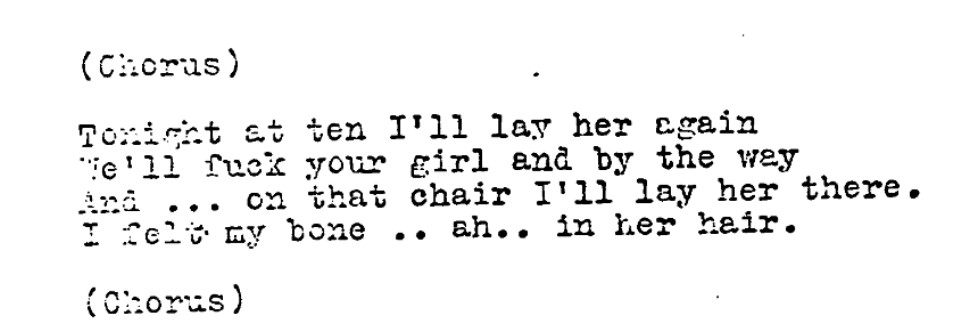
Feb 17, 1964, the FBI received the recording of The Kingsmen’s Louie Louie along with the claim that the lyrics are obscene when the 7” (normally a 45 RPM record) was played at LP speed (33 ½ RPM). The FBI label this investigation request Q1.
On Feb 28, the FBI laboratory examiners determined they could not make out the lyrics at all, even tho they were provided with lyrics from the record label as well as a copy of the proposed obscene lyrics. At that point, the FBI decided to drop the investigation, saying it’s not obscene.
By March 4, 1964, the FBI noted that the FCC, the Post Office, and the Justice Department had all dropped their investigations because they could not determine the lyrics regardless of speed (stating: “even after listening to the records at speeds ranging from 16 RPM to 78 RPM”).
March 16, 1964 The director of the FBI sent a follow up letter to the investigators checking in since he had received additional complaint letters. Then follows a back and forth detailing how one office said there are no discernible lyrics & another office saying they are investigating.
April 2, 1964, the FBI plans to dispose of the albums and lyrics…but then one office decides to retain the materials.
Query #2: Tampa.
April 2, 1964 It’s here we see a memo to the FBI Director discussing a minor female buying the album, unsuspecting of any obscenity but then was told if she played it slow then she’d hear obscene lyrics, which OF COURSE, she totally tried it and thus the FBI must investigate.
April 3, 1964, the FBI is now calling this Q2, and we have a new set of proposed obscene lyrics. Here’s the down’n’dirty verse:
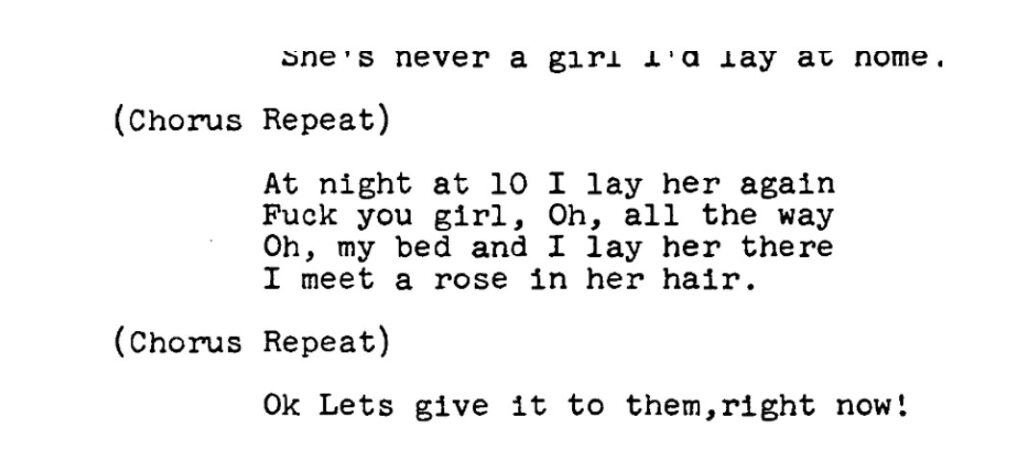
April 16, 1964, the FBI states the record “was played at various speeds but none of the speeds assisted in determining the words of the song on the record.” And the lab is permitted to destroy the records.
April 17, 1964, the lab reports to headquarters that they can’t make a determination and they’ve decided to retain “specimen Q2”.
We then see a record dated April 14, 1964, requesting the materials be destroyed at the lab.
Also April 14, 1964 is FBI memo stating they can’t make a determination and thus they do not believe any commercialization or interstate obscenity laws are broken. In this memo, they include a blow-by-blow detailed report.
Query #3: San Diego
We then get to ANOTHER set of lyrics submitted March 23. 1964. These are fairly raunchy all through the song.
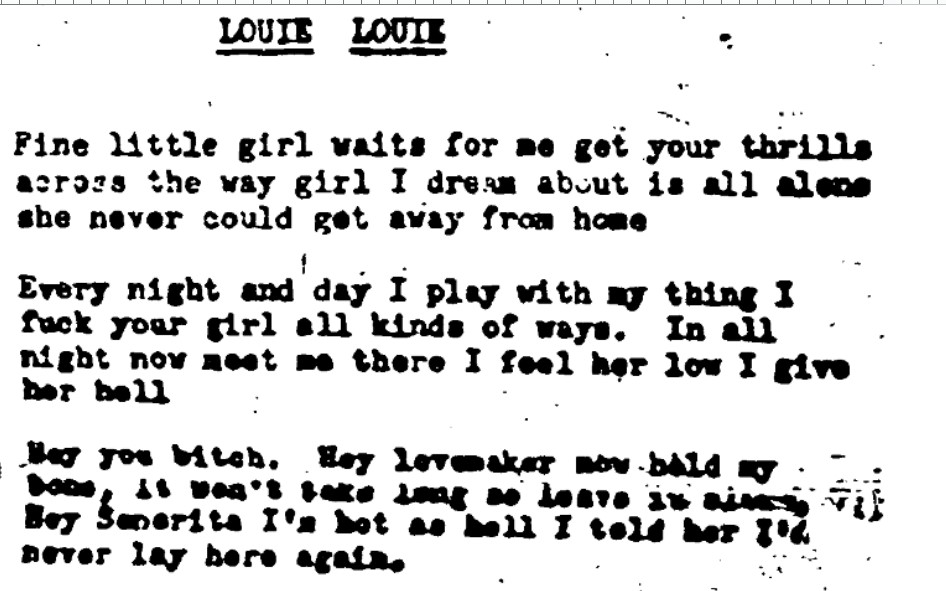
May 20, 1964: new copies are furnished to FBI departments.
That same day, May 20, 1964, FBI lab responds “cannot determine it to be obscene.” What follows is a reiteration of the flow of information and how May 13, 1964, the Assistant United States Attorney “advised he would decline prosecution in this case since the FBI Laboratory is unable to determine this record is obscene”.
May 20, 1964 Memo states no need to retain the copies, “may be disposed of in the laboratory.”
Query #4: Detroit.
April 22, 1965: ugh oh here we go again, this time from another city.
May 25, 1965 lab response “unable to interpret any of the wording” and while we’re at it, you should know that 2 other cities declined prosecution. After this, there proceeds the usual back and forth, a very similar story about a middle schooler with the album heard it has to be played 33 ½ RPM to hear dirty lyrics…blah blah blah… anyway, now we get feedback from the President of Wand Records, a letter to the FCC outlining the production of the song, a letter from the National Broadcasters Code Authority where the code staff state they “found nothing objectionable on it”.

June 21, 1965, Lab staff summarize findings to the Director of the FBI.
June 23, 1965, J Edgar Hoover, then director of the FBI, receives a letter from a concerned citizen.
June 25, 1965, a response is sent which includes the FBI findings and Hoover’s own opinions.

July 30, 1965, report of re-interviewing Wand Records & Limax Music. The FBI wants to re-record the song, or have it performed live for them to assess in-person if there are obscene lyrics.
The FBI is collaborating with FCC, Asst US Attorney, and other agencies to seek closure in the matter as congressional inquiries have begun.
Meanwhile, Hoover and the concerned citizen are getting chummy.
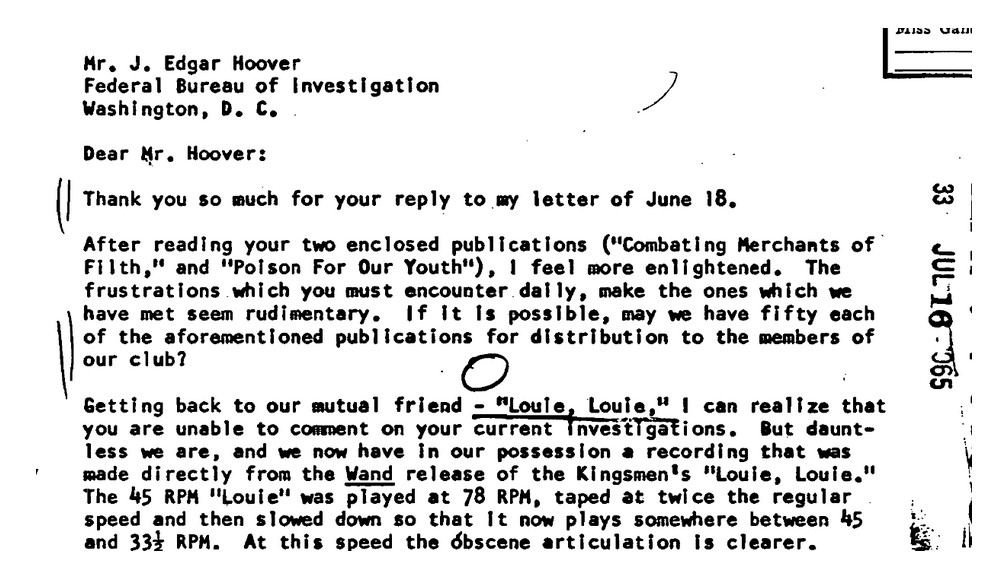
July 24, 1965, field office memo to director of the FBI which is HIGHLY redacted to the point of not making sense. There is a new complaint about the song.
August 23, 1965, Memo to FBI Director indicating they will retain records until matter is closed. Wand declined participation without a court order, however someone [redacted] sent a copy of the original recording so FBI can examine further. Confirmation that the recording is monaural one track, with no separate vocal track. The sound engineers tried their best to bring up the vocals to help with investigations.
August 24, 1965 FBI note receiving the audio and a fresh mimeographed copy of lyrics.
September 16, 1965: NO AUDIBLE DIFFERENCES NOTED between the new audio and Q3 recording.
October 29, 1965 copy of report furnished to FCC which states:

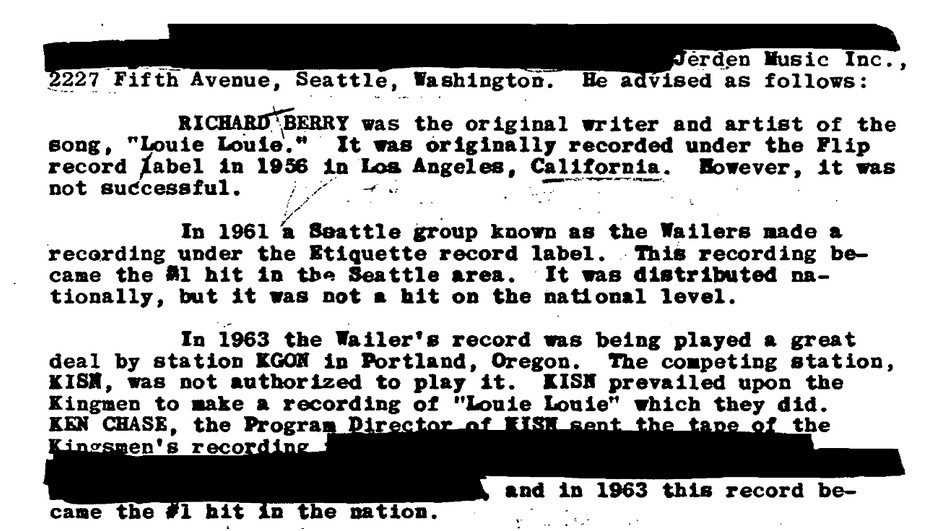
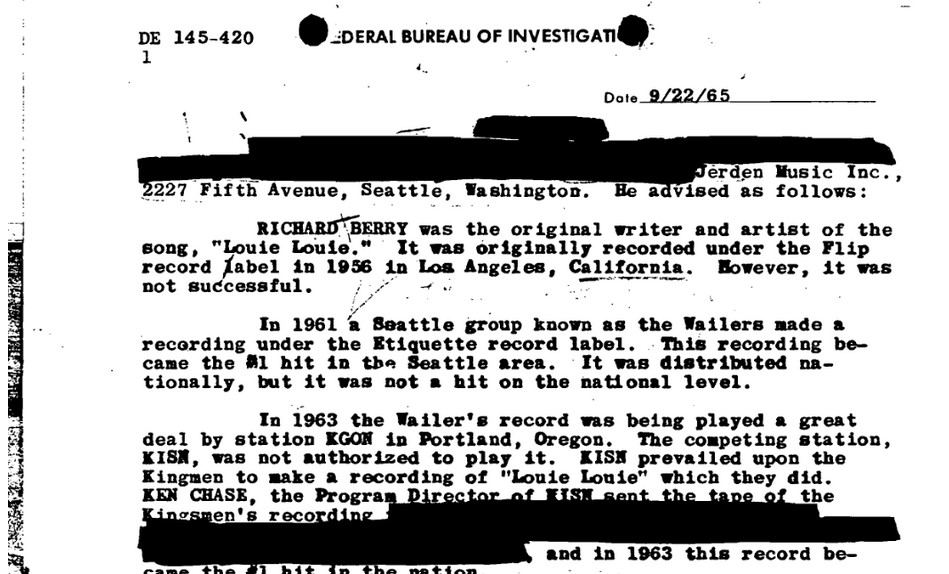
And then FINALLY the FBI has the actual copyrighted lyrics by Richard Berry from 1957, which are definitely not obscene.
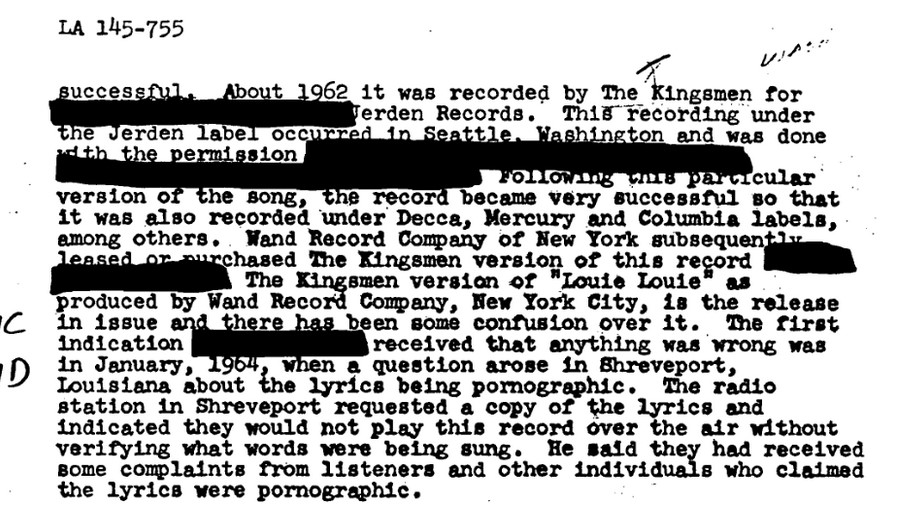
August 25, 1965 Richard Berry (name redacted but context clues are strong) interviewed by FBI.
August 25, 1965 (captured by dictation September 1, 1965) The Kingsmen interviewed by the FBI.
November 30, 1965 FBI to maintain contact with the Asst US Attorney in case he decides to pursue legal action. Same date, memo stating “did not contain any obscenity.”
December 2, 1965 Asst US Attorney reports he’s reviewed the matter and “no evidence of ITOM violation” and he was “recommending no further investigation”.
October 6, 1966 the FBI returns materials to Wand Recording.
END OF FILE
LEGACY CONTINUED
Several commemorative Louie Louie dates were issued in both Washington and Oregon.
-
- Portland had a one-time Louie Louie Day of Oct 5, 2013, to celebrate The Kingsmen’s induction into the Oregon Music Hall of Fame for their culturally significant contribution
-
- State of Oregon made April 2 Louie Louie Day in 1986
-
- In 1983, the state of Washington declared April 12 to be Louie Louie Day
-
- And then Seattle Mayor did a Louie Louie Day of April 15, 1983.
But these are all one-off days of celebration. They are not perennial.
Fun fact: Ross Schafer was a big advocate for the Washington LL days, going so far as to advocate it become the State Song – check it out
What’s the deal with 1983, you may ask… well… Here is a blog post that explains how a radio station called KFJC held a 3 1/2 day long Louie Louie marathon “Maximum Louie Louie” featuring live performers and recorded audio for a total of 63 hours and 41 minutes. There’s a documentary coming out all about it. The marathon got international attention (which in 1983 is a pretty big deal) AND RICHARD BERRY & JACK ELY (kingsmen singer) GOT TO MEET FOR THE FIRST TIME:
Here’s a blog description of the two greats meeting for the first time: https://www.louielouie.net/blog/?p=7575
To me, this humble AFAB white person who was born in Washington but moved to Oregon (who’s mom grew up in Portland and Dad grew up in Seattle), the story of the Louie Louie song history is one that demonstrates our American cultural history of appropriation. (I can hear some people reading this groan, but guess what THIS SHIT IS REAL.) It also demonstrates reclamation, doing the right thing, collaboration, and sharing the stage.
Richard Berry wrote a GREAT song. White folks throughout the 20th century were keen to record covers – covering anything they thought was cool regardless of who wrote it. Some times this was an act of desegregation, pointedly trying to remove racial divides and bring everyone together. Sometimes this was white washing, appropriation. You really should look into it. Here is a Rolling Stone article, plus an article called Whitewashing Classic Rock, one on covetousness and cruelty of white people covering black music & another about black culture appropriation. There is no shortage of evidence. In music history, from the start of music recording, people covering songs was extremely common & it was normal for white people in particular to cover the music of black people & make a profit, some times without crediting or sharing royalties. So it was that Berry’s tune was covered many times over (fortunately, he did get credit and royalties). That said, it’s questionable if the song Louie Louie would have grown such long legs if The Kingsmen hadn’t recorded it and the lyrics scandal hadn’t happened with full FBI examination. At the time, many black performers were considered to be salacious, hyper sexual, and corrupting for the youth. The media whirlwind around the song Louie Louie was a true frenzy in the time. It’s to The Kingsmen’s credit that they insisted the lyrics were clean & advocated for Berry, ensuring he received the recognition and royalties he deserved. And that they continued to highlight him and thank him…still to this day. This is the story we celebrate. The story of the original performer/writer receiving the credit they deserve.
In 1978, Animal House was released to movie theaters. And the white frat boy appreciation, where performers of color were spotlighted as the party soundtrack, brought Louie Louie back into the rowdy, raunchy forefront.

FBI File Complete “Louie Louie the 1960s Song”
